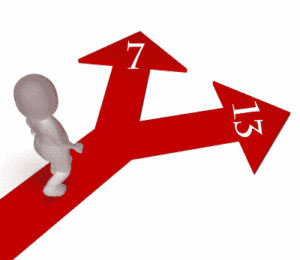Table of Contents
Types of Bankruptcies: Chapter 7 vs 11 vs 13
There’s a lot of confusion about the types of bankruptcies. Firstly, some clarification on jargon. You’ll hear a lot about bankruptcy chapters. What’s a chapter? Think of it as a bankruptcy type, or a kind, or flavor. While there at least five types of bankruptcies, most people thinking about consumer personal bankruptcy will focus on just two or three bankruptcy types, or chapters, including Chapter 7 vs 11 vs 13.
Listing the Types of Bankruptcies
Ok, so now that we have some basics out of the way, let’s take a look at the different bankruptcy types commonly used when people file bankruptcy.
- Chapter 7 bankruptcy: the most common bankruptcy type, used by people who don’t earn much income.
- Chapter 9 bankruptcy: for cities and municipalities.
- Chapter 11 bankruptcy: reorganization, typically of a large business
- Chapter 12 bankruptcy: for farmers and fishermen. Not used very much by Los Angeles bankruptcy debtors.
- Chapter 13 bankruptcy: repaying all or some debt with regular payments
- Chapter 15 bankruptcy: cases that cross borders, like international law
So many choices! Strangely, almost no matter what you select will be an odd choice. Where does someone even start with such a list when want to file bankruptcy? We can narrow the list down a bit.
Choosing a Bankruptcy Type or Chapter
In narrowing the list down, we notice that there are really two big classes of chapter: it’s either for an individual (consumer bankruptcy), or for a larger entity (government or business bankruptcy)
Personal bankruptcy vs business bankruptcy
The personal consumer bankruptcies are Chapter 7 and Chapter 13. These are the bankruptcy types done by most people who declare bankruptcy. They’re personal bankruptcy or consumer bankruptcy. Why? Because the individuals, the people, filing them, are consumers who are trying to get rid of (discharge) consumer debt, like credit cards, car repos, etc.
Getting down to business
In contrast, the business bankruptcies are Chapter 9 (city government), Chapter 11 bankruptcy (think of General Motors), Chapter 12 (fish or farms), or Chapter 15 (foreign).
What about a mom-and-pop business? Is that a personal bankruptcy since it’s “personal?” Is it a consumer bankruptcy because the people who own the business are consumers who decided to take a risk and start a business? It feels like a business bankruptcy. Or is it closer to a Chapter 11 reorganization like GM? There’s no hard-and-fast rule, but more often than not, a small business has debt guaranteed by the business owner, and can be a consumer bankruptcy. But you’ll want to contact to a Los Angeles bankruptcy attorney about that.
2024 Stats: Bankruptcy Filings for Los Angeles
2024 Los Angeles Bankruptcy Filings (reflecting last complete year)
- Chapter 7
- Chapter 11
- Chapter 12
- Chapter 13
- Chapter 7
- Chapter 11
- Chapter 12
- Chapter 13
Types of Personal bankruptcies (Consumer Bankruptcy)
Look at the chart above. if you’re like most people, you’re not a farm or fisherman, so chances are you’ll want a consumer bankruptcy (you can’t even see the Chapter 12 slice: most years in our district the number is single digits). So, this really narrows things down for most individuals to Chapter 7 bankruptcy and Chapter 13.
Chapter 7 is where you can’t afford to pay on your debts. Therefore, you don’t have to. Alternatively, Chapter 13 bankruptcy is where you can afford to make debt repayment.
And just for fun, some more Central District of California bankruptcy statistics about bankruptcy filings over time. This time, we’re just focusing on newly opened Chapter 7 bankruptcy cases in the Los Angeles area.
Central District of California Bankruptcy Filings
- Chapter 7
- Chapter 13
- Chapter 11
(Credits: filing statistics courtesy of Kathleen J Campbell, Clerk of Court; graphed by Los Angeles bankruptcy attorney Hale Antico)
A few points:
Chapter 7 filings are always more than Chapter 13 and Chapter 11 and Chapter 12 combined. This doesn’t mean Chapter 7 bankruptcy is better; it’s merely what more people are doing based upon the advice of the person to whom they’re consulting.
BAPCPA
Next, Chapter 7 bankruptcy cases spiked in 2005. This was largely due to over-hyped fear that Chapter 7 was going away with the new means test for Chapter 7.
Further, in 2006, all filings went down. This is because anyone thinking about filing bankruptcy did it in 2005 before it was “too late.”
Additionally, after 2007 the Chapter 7 filings were up higher than the 2005 reform. All chapters did. That may partially be due to BAPCPA and the bankruptcy means test. It’s also due to breaking of the Great Recesssion.
Boom and bust
After 2008, Chapter 13 filings really took off. This was largely because of people filing to stop foreclosure and save their home. Sure, there were probably some just paying the smaller filing fee with no intent on following through. Mostly, people were trying to use Chapter 13 to pay back the mortgage lates. This cycle peaked in 2010 with filings 3 to 4 times higher than what they were in 2017.
Finally, the mortgage market stabilized and the economy improved over the next few years. Consequently, bankruptcy filings went down for the next half-dozen years. The last few years leading up to 2019, Chapter 7 filings started trending up slightly.
In 2020, California median incomes are breaking milestones, which seems counterintuitive, since the COVID-19 pandemic hit and caused unemployment to spike up to double-digits for a time. Yet despite the virus pandemic and its hit on the economy, the Los Angeles County median home price remained high.
But what about Coronavirus and bankruptcy? You’ll see that 2020 bankruptcy filings were down across the country because of COVID, and in some chapters in the chart above, down by over 50% with Los Angeles bankruptcy filings compared to the year before. In 2021, Chapter 13 cases were down sharply from 2020, and that was the year we were under lockdown, moratoriums were put in place, stimulus and unemployment money flowed, and we couldn’t get to the court.
October 2022 saw about 20% fewer Chapter 7 filings in the Central Dist than were filed in October 2021. In fact, Oct 2022 marked the tenth straight month that Chapter 7 filings in the CDCA were lower than the same month the prior year. Year-over-year, each month has measured a decrease of at least 20% for Chapter 7 filings (most months over 30% lower), for all of 2022.
On the other hand, also through 10/2022, Chapter 13 filings have been higher each month this year in our district compared to the same month last year with the exception of February.
It’s now 2024. So, for the most recently completed full year, we saw an increase of filings to 21,073 over the prior year’s 17,290 cases. That’s a jump of about 22%, so Los Angeles bankruptcy new filings of all chapters are up in the Central District of California. For context, 2019 (the last pre-pandemic year) saw approximately 38,168 filings. We’re still down from before the pandemic hit. And 2019 was already slow. But things seem to be reversing, as the first few months of 2024, filings are up about 33% year-over-year for the same months the year before.
Chapter 7 vs Chapter 13
For most people, it comes down to whether to file Chapter 7 bankruptcy vs Chapter 13 bankruptcy. Each side has advantages and disadvantages, and every situation is different.
Key Advantages of Chapter 7 bankruptcy compared to Chapter 13
Chapter 7 bankruptcy has a lot going for it. Focusing only on the major benefits of Chapter 7 vs 13 types of bankruptcies:
- No debt repayment (usually)
- Over in less than 6 months (usually)
- Many people keep all their stuff
- Usually less expensive attorney fee
- Only one court hearing (usually)
Key Advantages of Chapter 13 bankruptcy compared to Chapter 7
Chapter 13 bankruptcy is not without its own benefits over Chapter 7. Here’s a look at where it shines:
- No trustee takes your assets. You keep all your stuff.
- Transfers and other interesting things you did before filing bankruptcy not an issue
- Can file bankruptcy again sooner
- Lets you catch up on mortgage lates and save your home.
- Feel good about paying back your debt on your own terms.
- It’s an open door if ineligible for Chapter 7 due to Means Test
- Automatic Stay bankruptcy protection extends to your spouse and co-signers
- Not forced to sign a Reaffirmation Agreement to be potentially stuck with debt after bankruptcy
Read our Ultimate Chapter 7 Bankruptcy Guide
Is it better to file a Chapter 7 or Chapter 13
The choice in types of bankruptcies leads many people to ask, “Is Chapter 7 better than Chapter 13?” There really is no way to say if it’s better to file Chapter 7 or Chapter 13, as each situation is different. Every client is unique, with priorities and circumstances unlike anyone else’s.
But it seems Chapter 7 Bankruptcy better than Chapter 13
It seems that Chapter 7 is the best of the types of bankruptcies, but again, everyone’s situation is different. How about some examples. Firstly, consider the person who doesn’t make much money, and qualifies for Chapter 7. However, maybe he has a two paid-off cars and some home equity. Or a lot of home equity. Or has filed bankruptcy before. This is not an ideal Chapter 7 bankruptcy.
Secondly, what about the person who transferred some assets in the past four years? Or took out $150,000 from their IRA and spent it all two years ago. They qualify for Chapter 7, but is it wise to file bankruptcy under that chapter? It may make more sense to file Chapter 13 bankruptcy.
Too much credit after bankruptcy
Thirdly, another example. More than a couple of times I’ve met someone who filed bankruptcy, got credit after bankruptcy, then got more debt before a job layoff and they can’t pay and they’re being sued, or suffering a wage garnishment. They need another bankruptcy, but enough time hasn’t passed. Chapter 7 bankruptcy just won’t work here.
These are three examples where someone will want to file Chapter 13 bankruptcy instead of Chapter 7, and we didn’t even talk about people disqualified from Chapter 7 by the means test.
I was told I should choose Chapter 7 Over Chapter 13
As you see, of the types of bankruptcies, Chapter 7 isn’t always better than Chapter 13 bankruptcy. However, some bankruptcy attorneys really only do Chapter 7 bankruptcy cases. These bankruptcy lawyers never really took the time to learn the intricacies of Chapter 13, and as a result, they shy away from them. When all you have is a hammer, everything looks like a nail. And when a bankruptcy attorney only does Chapter 7 cases, everything looks like a Chap 7.
Why wouldn’t bankruptcy lawyers do Chapter 13 cases?
When weighing Chapter 7 bankruptcy vs Chapter 13 bankruptcy, some bankruptcy attorneys don’t even compare; they just do Chapter 7s. Why wouldn’t a bankruptcy lawyer do all types of bankruptcies?
Firstly, Chapter 13 bankruptcy cases take longer. It involves a commitment of between 36 and 60 months. Not all bankruptcy lawyers want to be on the hook for everything that happens over the next 5 years. They want to get the money and run. Heck, I know of a Chapter 13 bankruptcy attorney who gets the fee, then disappears after the first three months. They then hand their clients off to another bankruptcy lawyer to deal with all the things that might arise the next 57 months. The person they bonded with at the consultation bails. Los Angeles bankruptcy lawyer Hale Antico sees all his Chapter 13 bankruptcies through to the end.
Some bankruptcy attorneys never learned Chapter 13 bankruptcy

Secondly, Chapter 13 bankruptcy cases have a much lower success rate than Chapter 7 bankruptcy. Nationally, about one of three cases have their payment plan finish. Judge Wayne Johnson of the Central District of California (where Los Angeles bankruptcy cases are filed), estimates only 3% of CDCA Chap 13 cases succeed, and approaches 0% where the person files without an attorney.
However, Los Angeles bankruptcy attorney Hale Antico has a Chapter 13 success rate higher than 0%, higher than 3% (the district average) and about double the national average. Over 70% of this bankruptcy lawyer’s cases succeed to the end. Partially, this is due to understanding all the twists and turns of Chapter 13 bankruptcy. Also, it’s because we prepare our clients, so there aren’t surprises. We have more than one tool in our belt, and not every case is a nail. We’ve successfully completed hundreds of Chapter 13 bankruptcy cases in an district where bankruptcy attorneys have a rate of success at just 3%.
Finally, because we succeed in Chapter 7 cases and Chapter 13 cases, we won’t steer you away from the scary thing we never learned. I’m pretty darn good at both, and so I’ll can give you an honest opinion if Chapter 13 is better than Chapter 7 for your situation. Because in many situations, when weighing Chapter 7 vs 13 in the types of bankruptcies, Chapter 7 is not always better than Chapter 13.
Chapter 7 vs 11
Looking at types of bankruptcies, many people want to compare Chapter 7 vs 11 for individuals. This doesn’t always make sense. When given the option between Chapter 7 vs 11 personal it’s like asking what’s better: apples or Thursday. Chapter 7 bankruptcy is for people who can’t afford their debts. Chapter 11 bankruptcy is typically for large businesses, and corporations. Yes, these corporations can be owned and controlled by an individual, so they may be curious about Chapter 7 vs Chapter 11 for individuals. However, the circumstances where that would make sense are few and far between. (disclaimer: Chapter 11 bankruptcy lawyers are a niche in the bankruptcy attorney field, and this one doesn’t do them).
You Keep Using that Word
One reason people compare Chapter 7 vs 11 is because of confusion. 7 and 11 go together on the craps table and convenience stores, so people naturally assume they’re a pairing in bankruptcy. As I wrote above, Chapter 7 and 13 are the real pairing. Most individuals don’t choose Chapter 11. There would have to be a good specific reason. When they say Chapter 11, many people really mean Chapter 13.
Another reason people automatically don’t really mean Chapter 11 when they’re thinking of Chapter 11 is the cost. I don’t know of too many bankruptcy lawyers who will start a Chapter 11 with anything less than a $10,000 retainer, all up front, just to get started. Few people can do that. A larger business might have the resources to do that, or an individual with a more complicated family corporation.
Individual Chapter 11 Does Fit Sometimes
Chapter 11 bankruptcy does provide some additional flexibility over a Chapter 13, and this can be more appealing to the person thinking about a personal Chapter 11. You’ll want to consult with a Chapter 11 bankruptcy lawyer. Additionally, some individuals don’t qualify for Chapter 13 bankruptcy because of the debt limits. This can come up more in Southern California where someone owning a rental property or two can have secured debt exceeding $1.5 million and can’t do Chapter 13, won’t want to do Chapter 7 because of liquidation, and would need to give a hard look at a Chapter 11 bankruptcy for individuals.
Finally, experience dictates that people who ask me about Chapter 11 really mean Chapter 13. We do both Chapter 7 vs Chapter 13, and are upfront that we don’t do Chapter 11 bankruptcies, but know a few good attorneys in the Los Angeles area that do. If interested, drop us a line for some good Los Angeles bankruptcy lawyers that do Chap 11 cases.
Summing up, tl;dr
There are about half-dozen types of bankruptcies. We took a good look at Chapter 7 vs 13 vs 11. But the real comparison is between Chapter 7 vs Chapter 13. While many bankruptcy attorneys steer people to Chapter 7 bankruptcy because that’s all they know, Chapter 13 bankruptcy has some advantages over Chapter 7. When you interview your Los Angeles bankruptcy attorneys, make sure they do both. Our Chapter 7 success rate is over 99%, and our Chapter 13 success rate is over the double the national average.
I’d consider it an honor to get the chance to help you.





